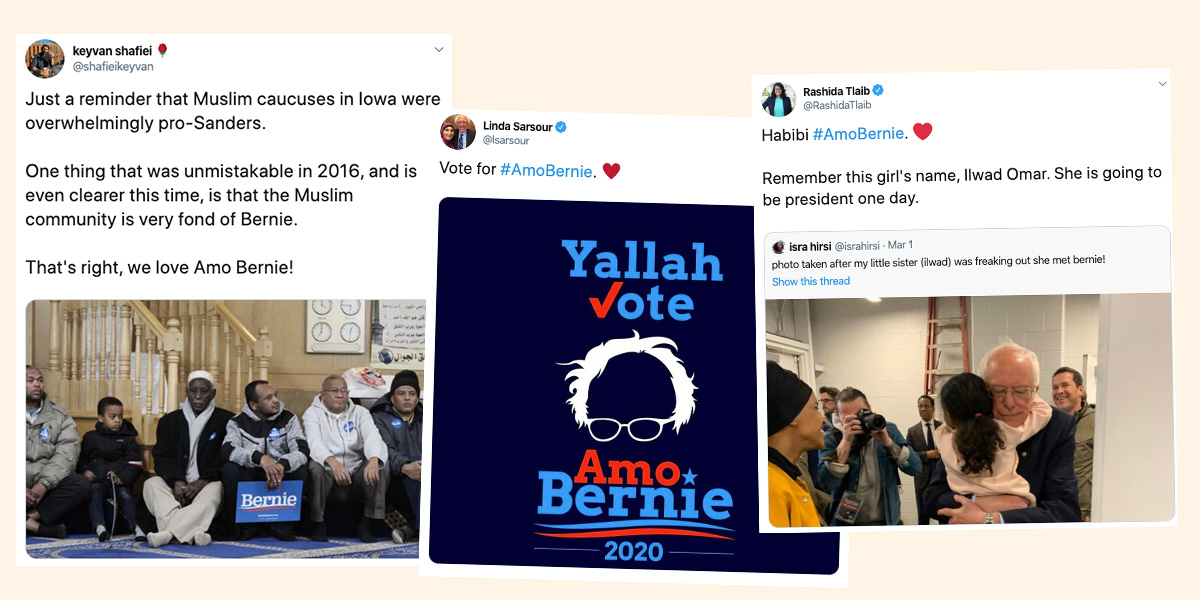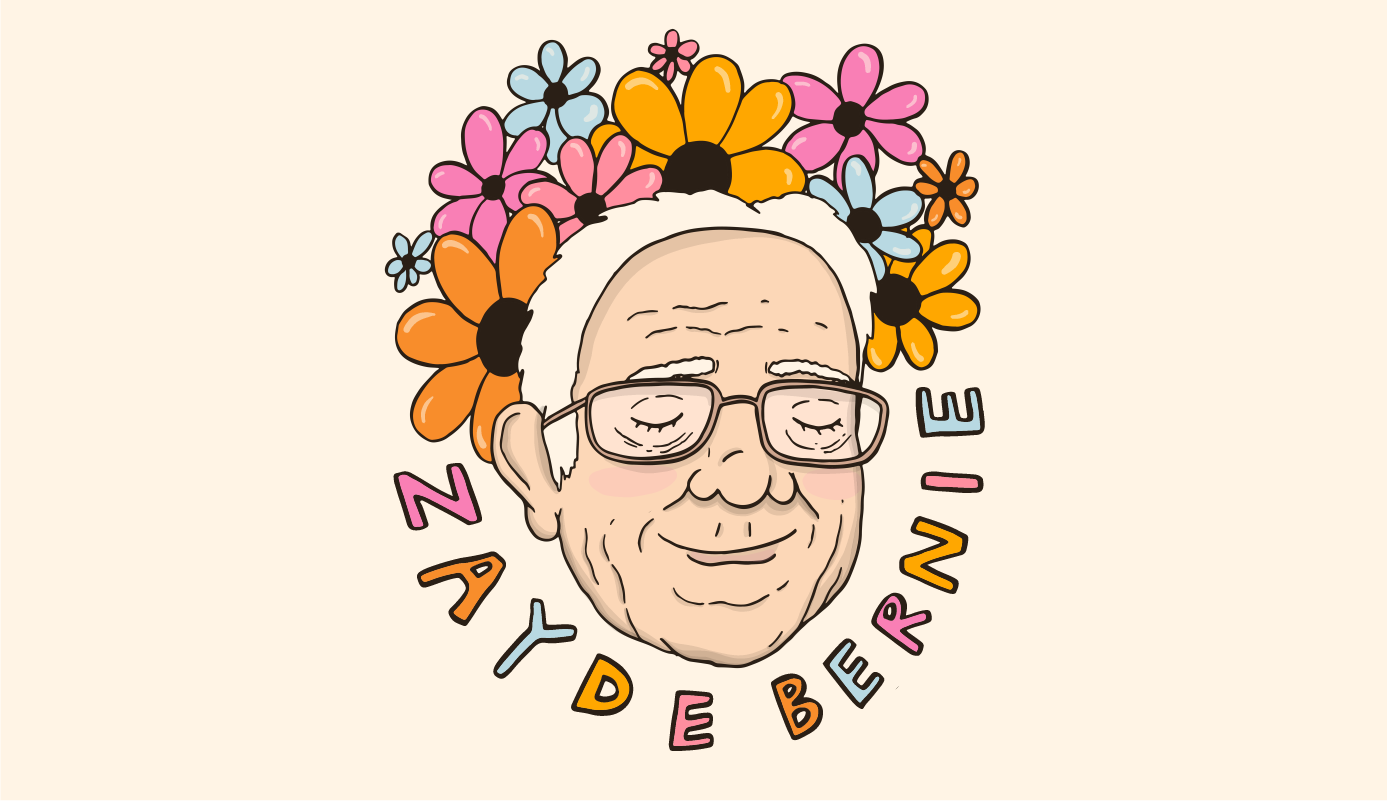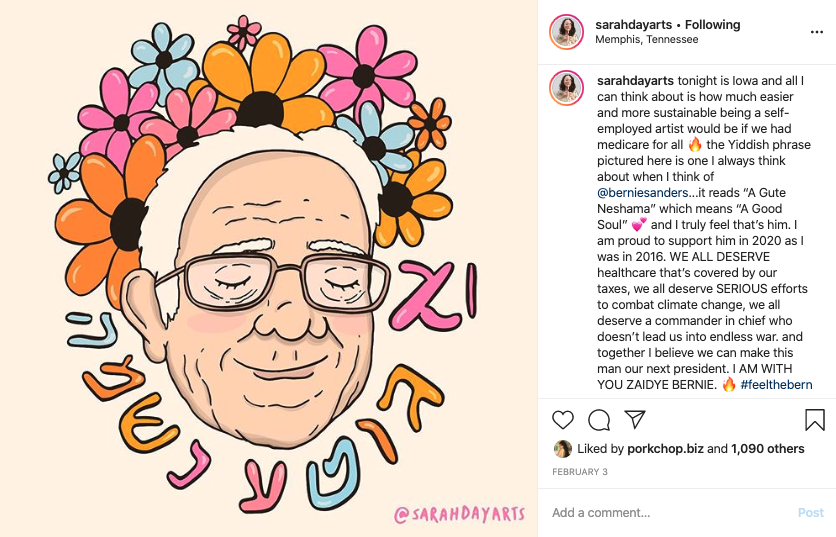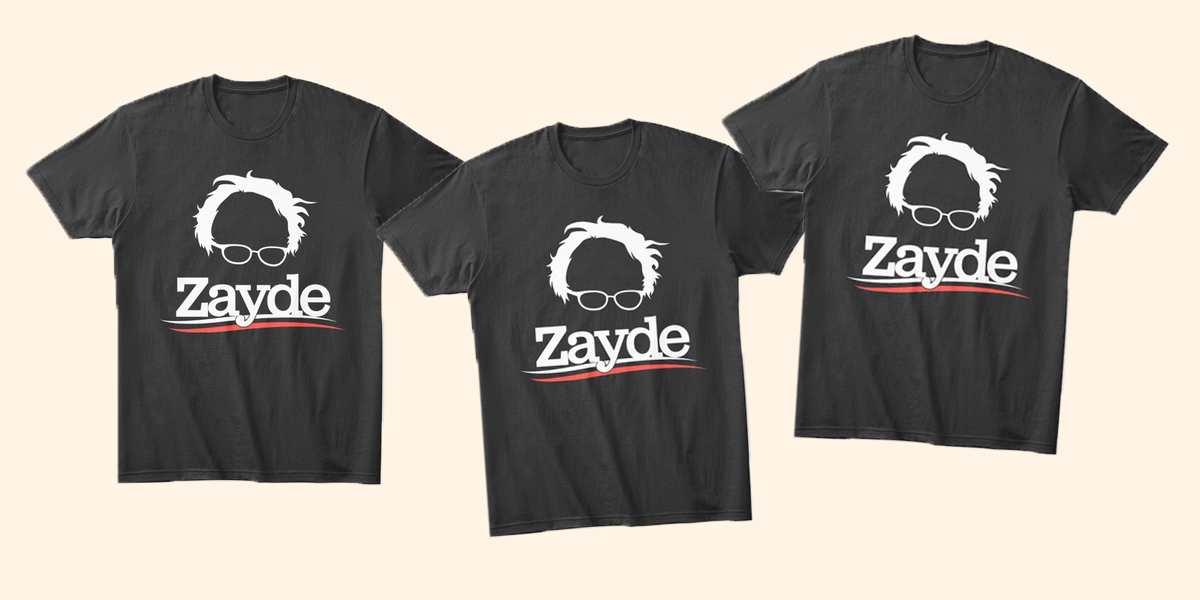Bernie Sanders is a 78-year-old Jewish man. He talks at a loud volume. He bears an uncanny resemblance to Larry David (as it turns out, they are distant cousins). And he reminds a lot of Jewish voters of their zayde, the Yiddish word for grandfather.
Unlike the 2016 primaries, this time around, Sanders has leaned into his Jewish identity during his campaign. He penned an essay on fighting anti-Semitism; he released a campaign video centering his Jewish identity; and he’s talked about what it would mean to be the first Jewish president (joining a long list of firsts in American Jewish political history). His open discussion of his Jewishness, combined with, well, everything about him, has made many of his Jewish fans start to call him “Zayde Bernie.”
(A note on spelling: Translating Yiddish to English is notoriously tough and subject to debate, but we’re going with zayde over zaide or zadie or zeyde, even though YIVO Institute weighed in on Twitter, writing, “YIVO standard would be zeyde.” I’m sorry, YIVO!!)
The earliest instance of combining “Bernie” with “zeyde” I could find on the internet — using all different spellings of zayde — was this reply from 2014, where Mx. Amadi (@amaditalks) shared a tweet calling Bernie a “zayde.” In a subsequent reply in May 2015, Amadi referred to Sanders as “Zayde Bernie.” When I chatted with Amadi, she clarified that she does not remember tweeting that — and it was not “meant as anything other than just the fact that he is by definition” a grandfather. Amadi says calling Bernie “zayde” was “not a term of personal affection when I used it, because I have no affection for him at all.”
Throughout the fall of 2015, and until Sanders dropped out of the 2016 race, people infrequently used the phrase “Zayde Bernie.” However, in the 2020 primaries, the phrase has become omnipresent among Jewish Twitter users.

What caused this phenomenon? On the most basic level, Bernie Sanders reminds a lot of Jewish people of their own family members. Calling him “Zayde Bernie” is a nod at Sanders’ familiarity to their own grandparents and other elderly Jewish people in their lives. Many Bernie supporters I spoke to often explained that he feels like either their grandpa, the grandpa they never had, or the grandpa who is more aligned with their political values.
“He’s a classic Brooklyn Jew, which makes me feel a kinship to him,” Ariella H., a Bernie supporter, explained to me. “He’s never afraid to talk about his Judaism, or his experience as a [relative] of Holocaust survivors, which I relate to as a second generation Jewish American. It makes me feel very connected to him.” Her second reason for calling Sanders “Zayde Bernie”? “Wish fulfillment: I never knew my maternal grandfather, and am not very close to my paternal grandfather, so Bernie is like the zayde I never had.”
Sara Starr, another supporter who calls him “Zayde Bernie,” literally has a grandfather who is also named Bernie. While hers doesn’t go by zayde, their mannerisms are super similar. “[Sanders’] Jewishness and the way he reminds me of my grandpa really makes the way he communicates and speaks resonate with me in a really familial way.”
Same goes for editor David Grossman, who explained, “He reminds me of a combination of both my father’s parents. My zayde was a rabbi, very focused on justice and kindness, especially for those he did not know. My grandma was loud and boisterous, eager to call a bullshitter a bullshitter. They were both from Brooklyn, older than Bernie, and were both well-acquainted with Jewish socialist organizations just as part of life. I’m unsure either of them would have voted for him, but the personality traits are so clearly familiar.” Another supporter, Sam Kaviar, echoed this sentiment: “Bernie feels like he could be part of my family,” and calling him Zayde Bernie is “just a way of showing love. He reminds me of my own grandparents who were also socialists, also from Brooklyn.”
Often, Sanders feels — er, sounds — exactly like young Jews’ grandparents.
Bernie supporter Lilly Sandberg explained, “My own zayde occupied a very particular intersection of grouchy, opinionated, and caring — alongside a whole lot of other old Jewish men. Men who will talk your ear off about the failure of American democracy over Zabar’s bagels, lovingly. I don’t know if Bernie fits the stereotype of a zayde in American culture, but he definitely fits my own stereotype of zaydes. The irony is that my zayde absolutely would have voted for Warren.”
The “Zayde Bernie” phenomenon extends even beyond American borders: Billy Cohen, a Canadian who is following the American elections, tells me that he calls Sanders “Zayde Bernie” even though “he really reminds me of an ideologically opposite version of my zayde.” Why call him zayde, then? Billy explains: “My zayde and Bernie are both super passionate, unflinching, super political, and want to maximize the good they do in the world, even if they take different routes to get there. I see my very Yiddish zayde in Bernie’s loudness, his hand movements, and just the overall shtick.”

Sanders’ Jewishness isn’t just relatable to those who have the same Ashkenazi Jewish heritage as the candidate. Rafael Shimunov, a Bernie Sanders delegate and co-founder of The Jewish Vote, is a Bukharian Jew. (Bukharian Jews originate from Central Asia.) Rafael doesn’t call Sanders “Zayde,” but rather, “Amak Bernie.” (Amak is a word for an uncle on your father’s side in Bukhori.)
“It’s both a sign of respect and he also reminds me of different aspects of different uncles,” Rafael tells me. “We tend to have huge families, so I have six uncles and another six uncles-in-law and if I could take different mannerisms from each I could very much start a build-a-Bernie workshop.”
There are a wide range of groups — not just Jews — who refer to Bernie as “Uncle.” Rafael thinks it’s a way of de-centering the idea that Sanders’ supporters are just white Bernie bros. “If you notice, a lot of people doing that are from small ethnic groups. I’m sure it’s usually just an endearing title in many cultures, for someone who seems like family because he isn’t perfect yet we hold him dear. But I think for me, and friends I know, it’s a good way to undo the myth of the white Bernie bro being the center of his campaign, by showing up as ourselves when we say Amak, Tío, Dadya Bernie (Russian), Amo Bernie (Arabic).”
Tío Bernie, in fact, has gotten so big that many mainstream news outlets have used it to describe Latino support for the Jewish frontrunner. Plus, Tío Bernie is a popular enough nickname that the Sanders campaign site sells shirts with this very phrase.

Amo Bernie, the Arabic phrase for Uncle Bernie, has stayed mainly on Twitter. Sanders is a favorite among Muslim Americans, and prominent Muslim politicians — like Rep. Rashida Tlaib, a Palestinian American, often tweets about “Amo Bernie.”

But, let’s get back to Zayde Bernie. For many, calling Bernie “Zayde” is a way of reclaiming — and centering — Sanders’s Jewishness.
“I think that for many people, calling Bernie ‘zayde’ is a way to reclaim the way he talks and carries himself, something which the media loves to make fun of (often bordering on ignorance if not anti-Semitic tropes of Ashkenazi Jews),” activist Abby Stein explains to me.
For Abby, who grew up in a Yiddish-speaking Hasidic family in Williamsburg, the term has a significant meaning in her culture. “Zayde is the Yiddish word for grandfather, but in cultural context, it means a lot more than a mere family term. Zayde meant someone with life experience, someone with the wisdom needed for the future generations. In most families, zayde also refers to the head of the family, the one who sets the tone for family customs and practices from spiritual to worldly matters.”
Abby, who is now an official surrogate for the Sanders campaign, continues, “As a native Yiddish speaker, when I think of ‘zayde,’ I think of a person with wisdom, a person who has been fighting for what’s right for decades, and a person whose leadership I want to follow. I can’t think of a better way to describe how I see Bernie.”
Eliza Klein, who lives in a communal Jewish group house with 13 other Jews in their twenties, tells me they all call Sanders “Zayde Bernie.” Eliza’s reasoning echoed Abby’s definition of zayde: “He’s a wise elder, a protector, and he’s angry on our behalf. Calling him ‘zayde’ honors and uplifts the legacy of leftist Jews — which he is part of.”
She’s right about that legacy. Sanders grew up in Brooklyn; his father was a Jewish immigrant from Poland and his mother was the daughter of Jewish immigrant parents from Eastern Europe. In the 1960s, Sanders was active in the Student Nonviolent Coordinating Committee (SNCC) and the Congress of Racial Equality (CORE). He joined sit-ins protesting University of Chicago’s segregated housing policy. Sanders’ activism was part of Jewish history, as one of many from the Jewish left who participated in the Civil Rights Movement.

Abby also sees her Jewish values reflected in Sanders: “To me, Bernie also represents — more than any candidate in my lifetime — my Jewish values of social and racial justice, tikkun olam, being a light upon the nations (with his foreign policy), speaking up in the face of those in power being wrong even at great personal cost, and much more.”
Samantha Cohen, who tweets under @koshersemite, shared that she calls Sanders “zayde” for very similar reasons. For her, Bernie represents “much of what my own Judaism symbolizes for me. My Judaism is centralized around tikkun olam. While he is not completely where I want him to be, it’s kind of a grandfather characteristic to even be more conservative than your grandkids want you to be. But he’s there enough for me to call him my zayde, and I admire him like a grandfather.”
Sanders’ history of activism — particularly the Jewish lens through which he approaches this activism — factors into the decisions of many to refer to him as “zayde.”
Lilli Sher, an Alma college ambassador, shared, “I’ve honestly been moved to tears watching speeches and debates in which he talks about how Judaism informs his social activism and his desire to strive for a more just and equal society.”
Artist Sarah Day — whose illustration of Bernie is the header for this very article — explains that she calls Bernie a zayde because “I think the idea of Zayde Bernie is a fantasy for some of us; the ideal of a Jewish elder who is on our level, with whom we could express our political views without fear of alienation or retribution. Even though my parents don’t like Bernie as a candidate, there are still things about him that are just so essential to the Ashkenazi experience that I can’t help but be reminded of my family and my heritage, even if he doesn’t evoke memories of specific family members.”
Sarah was first inspired to draw Bernie with a Yiddish phrase around his head (above) because she wanted to create a “sweet, positive image” of Bernie. “So many of the Bernie cartoons I’ve seen portray an angry man,” she explains, “and frankly, a lot of them are reminiscent of anti-Semitic imagery from the 19th-20th centuries. So I wanted to make something different that would tell a different story about this man whose policies are compassionate, someone who recognizes human needs as human rights, someone who is looking out for our planet and our future generations.”
Two truths: people who are Concerned about Bernie being uniquely “angry” are looking for an antisemitic dog whistle people find palatable. Also, I am an angry Jew and I love my telling gesticulating zayde.
— Sarah W(rath 🌈🍉) (@toasterposey) February 20, 2020
Mal Blum, a Jewish musician, endorsed Bernie with a tweet calling Sanders “America’s zayde.” Mal explained they call him zayde “because some people try to erase his Jewishness, I like to emphasize it.” Plus, Mal said, Sanders “has strong grandpa energy.”
Bernie supporter Eva Cantor also uses “zayde” to emphasize Sanders’ Jewish identity. Cantor tweeted, “Zayde is a little ironic definitely, but as a Jew born deep in the diaspora who’s managed to retain a deeply Jewish identity in spite of it, I’d be lying if I said Bernie’s Jewishness wasn’t important to me.”
This is part of the reason the Jewish Worker created a Zayde Bernie t-shirt:
Why make the shirt? “We’re extremely proud to have a Jewish person who represents our values, culture, and history as descendants of immigrant laborers out front standing up for what we believe in, fearlessly and unashamedly,” Naftali Botwin, the pseudonymous editor of the Jewish Worker, said.
But still, not everyone is convinced Sanders should be called “Zayde Bernie.” Some bristle at the idea of constructing politicians as relatives. “Bernie Sanders is not your grandpa,” the argument goes. “Elizabeth Warren is not your mom.” This logic pushes back against calling Bernie “zayde,” telling people to stop projecting familial relationships onto Bernie.
Marion I. Lipshutz, a self-described “proud Jewish feminist and democratic socialist” is a Warren supporter (Sanders is her second choice). Marion explained to me that she dislikes the term because, simply, Sanders is not her zayde: “It’s cloying, and it speaks to a phenomenon of almost cult-like adoration among some Bernie supporters. I’m not deciding among competing zaydes. I already have two zaydes, alas both deceased. I’m deciding on who will be the best president. And I’m consistent; Joe Biden is not my Uncle Joe!”
Joe is not your Uncle
Bernie is not your Grandpa
Liz is not your MomGrowwww uuuuppp https://t.co/Z9Msb3vDgO
— Armand Domalewski (@ArmandDoma) March 3, 2020
I'm so tired of people arguing about candidates by talking about their personality? "Warren is a nice mom" "Bernie is a grandpa" here's the thing, none of it matters, we don't need a "cool pta member who bakes cookies" to run the country, we need someone who's gonna get shit done
— eri's mgs Brainrot Arc🇵🇸🏳️⚧️ (@cryyptorchiid) March 3, 2020
One Sanders supporter, Gabriella Jenine, puts it simply: “This is a very Jewish answer: on one hand, hero worship is never a good idea. On the other, feeling represented by the first Jewish front runner for President is hugely exciting!”
Zayde Bernie? Yeah good, okay.
Header Image illustration by Sarah Day.





